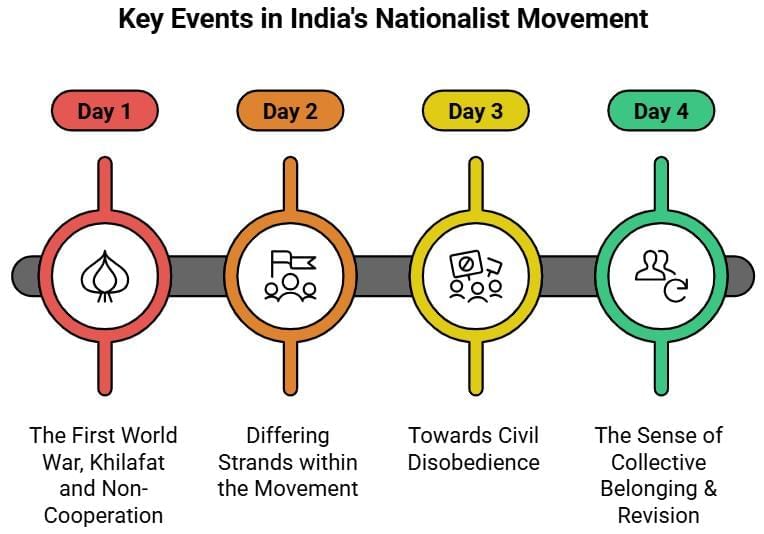4 Days Timetable: Nationalism in India | Social Studies (SST) Class 10 PDF Download
The chapter we are about to explore, "Nationalism in India," is a significant component of the Class 10 Social Science curriculum, particularly from the book "India and the Contemporary World." This chapter holds immense importance not only for your academic knowledge but also for excelling in the Class 10 board exams. It encompasses various topics that shed light on India's struggle for independence and the evolution of nationalism in the country. To perform well in the board exam, it's essential to have a comprehensive understanding of the following topics within this chapter:
Topics to Cover
Before we dive into the study plan, let's outline the topics we need to cover in this chapter:
Now, let's structure our study plan for this chapter:
Day 1: The First World War, Khilafat and Non-Cooperation
What to Cover:
- The impact of the First World War on India.
- The Khilafat Movement and its role in the Indian Nationalist Movement.
- The Non-Cooperation Movement led by Mahatma Gandhi.
Study Tips:
- Start by reading the relevant sections in your NCERT textbook.
- Utilize EduRev's Chapter: Nationalism in India for a concise overview.
- Enhance your understanding with EduRev's Mindmap and Unit Test.
Day 2: Differing Strands within the Movement
What to Cover:
- The differing ideologies and approaches within the Indian Nationalist Movement.
- The role of leaders like Subhas Chandra Bose and Bhagat Singh.
Study Tips:
- Dive into the corresponding sections in your NCERT textbook.
- Use EduRev's Chapter Notes for a deeper understanding.
- Challenge yourself with EduRev's Assertion & Reason based questions.
Day 3: Towards Civil Disobedience
What to Cover:
- The progression of the Indian Nationalist Movement towards Civil Disobedience.
- The Salt March and its significance.
- The role of women in the freedom struggle.
Study Tips:
- Revisit the relevant sections in your NCERT textbook.
- Utilize EduRev's NCERT Solutions to clarify any doubts.
- Solve EduRev's Practice Questions for thorough preparation.
Day 4: The Sense of Collective Belonging & Revision
What to Cover:
- The idea of a collective belonging among Indians.
- How the struggle for independence fostered a sense of unity.
Study Tips:
- Go through the last section in your NCERT textbook.
- Review key concepts with EduRev's Flowcharts & Important terms.
- Test your knowledge with EduRev's Case Based Questions.
Revision
On this day, focus solely on revising the topics you've covered over the past four days. Use the following resources for effective revision:
- EduRev's Topic Wise tests for each topic.
- Solve past year questions available in EduRev's Past Year Questions.
- Reinforce your understanding with EduRev's PPT.
By following this structured study plan and revising effectively, you'll be well-prepared for your Class 10 board exam. Remember, practice is key, so don't hesitate to solve various types of questions to solidify your knowledge.
For a comprehensive approach to your Class 10 studies, including other subjects, explore the Class 10 Boards section on EduRev.
Here is a list of all the important links and topic links for the chapter "Nationalism in India" from Class 10 Social Science:
Important Links:
- Past Year Questions
- Chapter: Nationalism in India
- Chapter Notes
- NCERT Textbook
- NCERT Solutions
- Short & long questions & answers
- Unit Test
- Mindmap
- Crash Course Social Science Class 10
- Assertion & Reason type questions test
- Assertion & Reason based questions
- Practice Questions
- Flowcharts & Important terms
- Case Based Questions
- Maps
- PPT
- Worksheet with Solutions
- Key Concepts
These links will help you navigate through the chapter and access additional resources to aid in your preparation for the Class 10 board exams.
Good luck with your studies!
|
95 videos|815 docs|79 tests
|
FAQs on 4 Days Timetable: Nationalism in India - Social Studies (SST) Class 10
| 1. What were the main causes of the First World War and how did they impact India? |  |
| 2. What was the Khilafat Movement and how did it relate to Indian nationalism? |  |
| 3. How did the Non-Cooperation Movement emerge and what were its objectives? |  |
| 4. What were the differing strands within the Indian National Movement during the early 20th century? |  |
| 5. How did the sense of collective belonging develop among Indians during the national movement? |  |






















